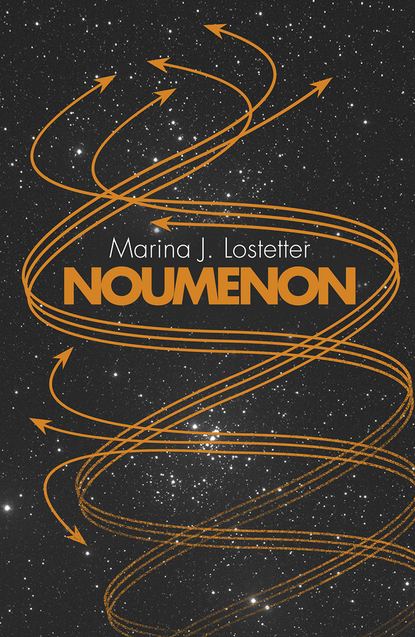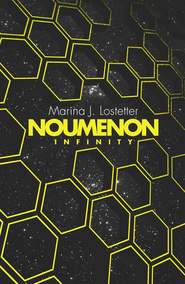По всем вопросам обращайтесь на: info@litportal.ru
(©) 2003-2024.
✖
Noumenon
Настройки чтения
Размер шрифта
Высота строк
Поля
We had our first suicide.
“Mags! Margarita? Margarita, let me in!” Fists banged on my door and panicked cries stabbed through the walls. I woke up startled and disoriented. It took me a moment to place the voice as Nika’s.
My fumbling brain knew something was off before I made it through the dark to open the door. It wasn’t just the alarm in her voice; she hadn’t called me on my implants, and was ignoring the door’s buzzer.
“Lights,” I demanded of the room. I met my friend with a terse “What?”
Tears flowed down her puffy cheeks, and her lips trembled. I’d never seen Nika cry before, and these weren’t typical bad-day tears. Something horrible had happened, and she was near hysterics.
“He, he—I just found—I—” The hiccups started, and she couldn’t get any words out.
I pulled her inside, sat her down at my small table, and pulled the comforter from my bed to throw around her shoulders. Without asking I made her a cup of tea in my kitchenette and plopped it down in front of her. She barely acknowledged the mug.
Gritty sleep rimmed my eyes. Rubbing it away, I pulled up a chair beside Nika. When the hiccups stopped and her breathing steadied, I prodded. “What’s wrong?” I’d never known Nika to get unduly emotional. If she was upset, things were bad.
“I went to go see Lexi. I couldn’t sleep. He was working the night shift and— Ooh, God.” She let her forehead fall to the table. “He’s dead.”
Had I heard right? “How?” I lowered my head to her level. “Nika. What happened?” Lexi was an engineer, and Nika’s biological cousin. I thought maybe there’d been an accident, that some of Mira’s machinery had caught him. Never in a million years would suicide have crossed my mind.
But that was exactly what had happened. Lexi had hung himself deep in the bowels of the ship.
“What does it mean?” Nika asked. “Weren’t—weren’t we screened for this? We share genetic code. If he can kill himself …”
“No,” I jumped in. “You couldn’t. It won’t get that bad.” I put my arms around her, but knew we couldn’t sit there. We had to tell someone—the captain. “Nika. He’s still there, isn’t he?”
“I couldn’t touch him. I saw and I—I ran. He’s still there.” The realization that she’d left him hanging in his noose disturbed her, and she fell apart again.
Nausea made my stomach boil. The situation hadn’t hit home yet, hadn’t grabbed my emotions yet. Which meant now was the time to act, before I became a puddle like Nika.
I’d have to report this to Saul.
At the thought, I was instantly ashamed, embarrassed. But now wasn’t the time to think about that, so I pushed thoughts of later duties aside and helped Nika to her feet. “We have to let the security officers know.”
“I left him there,” she mumbled. “I ran and left him there.” She felt like a rag doll in my arms.
I’d thought to drag her to the security offices near the bridge, but she’d fallen into a stupor. Nika stared into space like she could see through the walls. My best friend was in shock, which meant I was left holding the bag.
This seemed like as good a time as any to give the convoy-wide security alert system a spin. I activated it via my implants, choosing the officers only option. A red light blinked at the edge of my peripheral vision, letting me know the alert had gone through. Immediately, I second-guessed the action. Perhaps I should have left Nika alone in my apartment and gone to the bridge myself. Maybe this didn’t constitute a convoy-wide emergency—or did it? It was our first death, and it was as unnatural as they came.
“I.C.C., are you there?”
“Yes. You have activated the—”
“I know. There’s been … Nika’s cousin …” I couldn’t get the words out.
“You are hyperventilating,” the computer observed.
I was—my hands were going all tingly.
“Close your mouth and inhale slowly through your nose.” I.C.C. was clearly more concerned with my present state than why I’d used the alert system. I wasn’t sure what to think of that. Wasn’t sure what to think about anything, actually.
Security officers busted through my door like they were performing a drug raid. My apartment-for-one became a sardine-can-for-twelve in under two minutes. The officers separated Nika and me in an instant—thinking a domestic dispute, I’m sure. It took me a few minutes to assure them we weren’t the problem. They were overly eager and hopping, as unsure in the execution as I was in the concept, but itching to do their duty, to solve whatever the problem might be.
Unfortunately, the hubbub pushed Nika into silence. I couldn’t get the exact location out of her, and bringing up Lexi’s work agenda from the cached files only told us he was scheduled to perform routine maintenance. So they left me to attend to my poor friend while they scoured the ship’s innards for a body. It took me a moment to realize our big mistake—we had all forgotten to ask I.C.C. for help. I.C.C. would know where he was.
“I.C.C., do you have Lexi’s location? Please direct the officers.”
“I will. Your breathing has normalized.”
“Thank you.”
Stupid. So stupid. I.C.C. should be programmed to alert us to this kind of thing. We shouldn’t have to stumble upon it. Privacy be damned.
Like everyone in the convoy, I knew Lexi, if only on the level of acquaintance. He’d seemed happy whenever I saw him, but I’m sure I had seemed happy to him, too.
The shrinks saw the event as a tragic failure on their part. They sent out emergency psychiatric evaluations and made sure everyone had an appointment to meet one-on-one with a doctor.
They assigned me to a session with Dr. Yassine. A nice enough guy, if a bit fidgety. Forgive me if I think doctors who work with people on the edge should be calm, collected, and stately, but if I were ever on the fence about killing myself, I think Dr. Yassine’s inability to sit still would have driven me to it. I almost got up and grabbed his hand to stop his pen from tapping. Almost.
He wanted me to “explore myself verbally.” But when you don’t feel comfortable with someone, it’s not easy to open up. I didn’t want to “explore” with him. It’s not that I had a problem telling him what was going on in my head. It was just that I knew it would be a lot more helpful for me to share it with someone else. Someone specific.
I resolved to stop telling Saul I was fine when I wasn’t. I hadn’t seen the harm in keeping my emotional distance before, but now … Keeping up appearances wasn’t worth crumbling inside.
So I made my next report ahead of schedule, and tacked on a letter for Saul. I told him everything. How I was feeling. How I was coping with the suicide.
How I was sure there would be more to come.
I wondered—in writing—about purpose. Mine seemed obvious enough. But what about the others? We’d created false purposes for them—something to keep their DNA busy until we reached the anomaly. The engineers hated being called mechanics because that’s not what they wanted to be. Nika was a historian, a diplomat, and that meant she needed to be working with people and their history. As noble as she made archivist seem, it wasn’t who she was.
Saul made all of it seem okay. He reminded me of the mission. How Earth was counting on us. We were brilliant scientists, doctors, inventors, thinkers, and Earth had given us up for a greater purpose.
I was looking at things too narrowly, he said. That our purpose was in the journey, in experiencing life as humans had never experienced it before. I found our situation—locked in tin cans hurling through a vacuum—boring, depressing. He said the people back home found it wondrous. That my messages were now studied all over the globe.
[You can’t see the forest because you’re a tree] he’d sent. [A tree might ask, Why do I grow here? Why do I produce cones instead of fruit? Or, why must I lose my leaves when that tree stays ever green? If you could show the tree how it fits into the forest, how it provides so much to the greater being that is the forest, what might it think of itself then?
[Show them the forest, Margarita. The trees are dying because they don’t see the forest.
[P.S. I have a daughter now. I named her after you. People have been naming their children after you voyagers for years now, and probably will for centuries to come.]
The metaphor might have been heavy-handed, but it and his postscript were exactly what I needed—what all of us needed.
But it took six months and three more suicides for me to take action. And I regret that to this day. As a member of the governing board (all department heads had a place in politics) I had a duty that far exceeded my station. But I was still so new to independence that I had yet to grasp my authority. I was basically a kid trying to be an adult—to be a leader. They had trained and trained and trained us until I could recite leadership principles in my sleep, but in the end, a person also has to want to be a leader. To rise to the occasion. I only wish I had found my place sooner.
I couldn’t change the past. But I was pretty sure I could change the future.
I put in a personal request to see the captain. In later years that would have put me on a waiting list as long as my arm. Back then I practically walked in.
Entering Captain Mahler’s situation room, I lead with the holoflex-sheet. In my eagerness to prove a point I’d forgotten to salute and do our introductory dance. Nothing like starting out on the wrong foot when you’re trying to save your entire community from emotional collapse.






